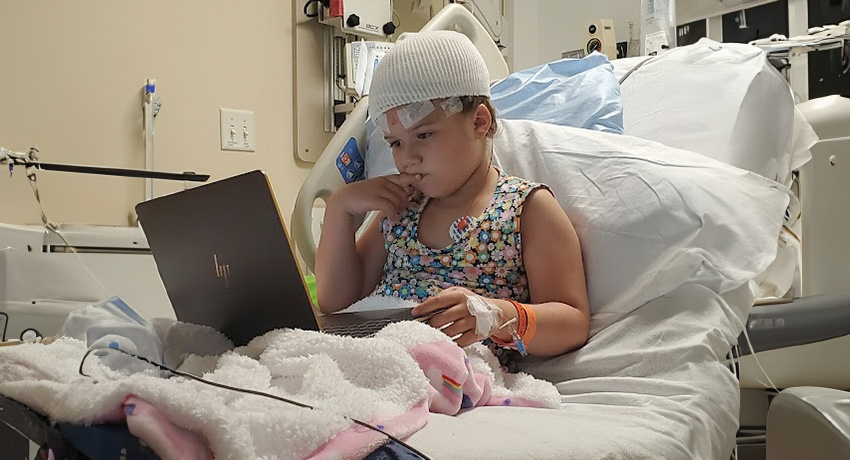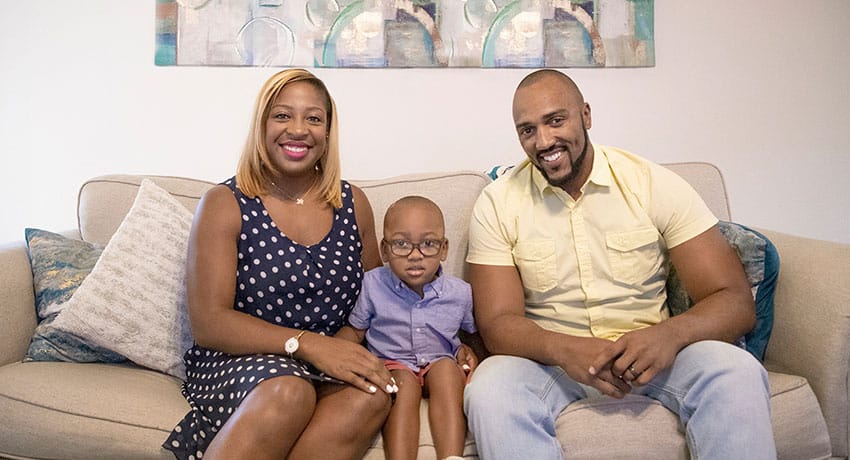UT Physicians pediatric epileptologists, based in Houston, TX, specialize in the evaluation, diagnosis, and treatment of children under the age of 18 with epilepsy.
Epilepsy is a neurological condition that affects the nervous system. While the underlying cause if not identified up to 70 percent of the time, it’s actually quite common, affecting one in 100 children, or 1 percent of the population.
Seizures are a symptom of brain dysfunction. Seizures are sudden, abnormal changes in behavior that cause involuntary actions due to a brain malfunction. These actions can be rhythmic movements of extremities, muscle contractions, staring and/or loss of consciousness, just to name a few. Seizures can present in many different ways, and they can last from a few seconds to minutes, on average.
Comprehensive Care Team Approach
The UT Physicians pediatric epilepsy team includes neurologists, neurosurgeons, radiologists, neuropsychologists and other highly trained, proficient staff who provide patient-centered, compassionate care you can count on during your epilepsy journey. All of these specialists are specifically trained in pediatric care.
The program provides you with one place where you can receive coordinated care. Our physicians serve as full-time faculty members of McGovern Medical School at The University of Texas Health Science Center at Houston (UTHealth), and possess the leading-edge knowledge needed to provide the best possible care for you.
Patient Care
From clinic locations across Greater Houston to a collaboration with Memorial Hermann Hospital, we provide complex care, neurological exams and specialized treatment. As a Level 4 program by the National Association of Epilepsy Centers, you will find yourself at the center of cutting-edge research to solve the greatest challenges in the field of seizure disorders.
Scope of Expertise
Our board-certified pediatric epileptologists are leaders in providing the most techniques in treating epilepsy.
Testing
- Epilepsy Monitoring Unit (EMU) Stays (Video EEG Monitoring)
- MRI
Types of epilepsy treated
- Generalized Epilepsy
- Juvenile Myoclonic Epilepsy
- Refractory Epilepsy (Intractable Epilepsy)
Treatments offered
- Ketogenic Diet
- Neurosurgery
- Vagus Nerve Stimulation (VNS)
Research
As faculty members at McGovern Medical School, our team has ongoing clinical trials in the field of epilepsy.
Qualified patients are able to enroll in a range of clinical trials for both investigational drugs and procedures.
The neuromuscular program is focused on providing the latest state-of-the-art clinical care to the patients with neuromuscular disorders. As part of the only Center of Excellence in Texas, our group of neuromuscular faculty will provide expert diagnosis and management of inflammatory neuropathies for patients who are unable to consult with medical experts in the field in their own communities. The center specializes in the diagnosis and treatment of Guillain-Barré syndrome (GBS) and chronic inflammatory demyelinating polyneuropathy (CIDP) and variants.
Guillain-Barré Syndrome (GBS)
GBS is an autoimmune disorder affecting peripheral nerves. GBS is the most common cause of acute flaccid paralysis in the world. The symptoms start rapidly and typically include numbness and tingling and weakness that often start in the legs and spread to other parts of the body including arms, respiratory, and facial muscles. In some patients, this is a life threatening condition due to weakness of respiratory muscles and autonomic disturbances affecting heart and blood pressure. About one-third of the patients require respiratory support with a ventilator during the course of GBS. Virtually all patients diagnosed with GBS require admission to the hospital. Nerve conductions, lumbar puncture, and blood work up are performed to confirm the diagnosis and exclude other conditions that can mimic GBS. There are two immunomodulatory treatments, plasma exchange and IVIG, which have been shown to be beneficial in clinical trials that are administered to patients with GBS.
Chronic Inflammatory Demyelinating Polyneuropathy (CIDP)
CIDP is a chronic disorder affecting peripheral nerves. This is also considered an autoimmune disease in which immune effectors attack and injure covering of the nerves called myelin. Clinically, patients experience progressive muscle weakness, sensory disturbances such as tingling and numbness, and walking difficulty. In typical cases, symptoms progress over two or more months. Neurological evaluation include nerve conduction and EMG test, spinal tap, blood and urine testing, and in some cases nerve and muscle biopsy to confirm the diagnosis and exclude other conditions that can resemble CIDP. Chronic treatment is often necessary and primary medications include corticosteroids such as prednisone, IVIG, and plasma exchange. In some patients, use of chemotherapeutic agents is necessary to control the disease. In the majority of patients, work up and treatment can be performed on an outpatient basis.
Scope of Expertise
- Immune-mediated Neuropathy
- Neuromuscular Disorders
- Neuromuscular Junction Disorders
- Neuropathology
- Polyneuropathy
- Peripheral Nerve Injuries
- Plexus Disorders
Procedures
- Nerve Conduction Study and electromyography (EMG) for evaluation of peripheral nervous system, neuromuscular junction, and muscle disorders
- Nerve and muscle biopsies
Research
As faculty members at McGovern Medical School, our team is working to solve the greatest medical challenges of our time.
Qualified patients are able to enroll in a range of clinical trials for both investigational drugs and procedures.
Visit our clinical trials information to learn more.
If you would like to meet with a UT Physicians specialists, please click below and use the online tool to help us contact you.
Pediatric Epilepsy Contact Information:
To contact the UT Physicians Pediatric Neurology team, please call (832) 325-6516 or send an email to [email protected].












